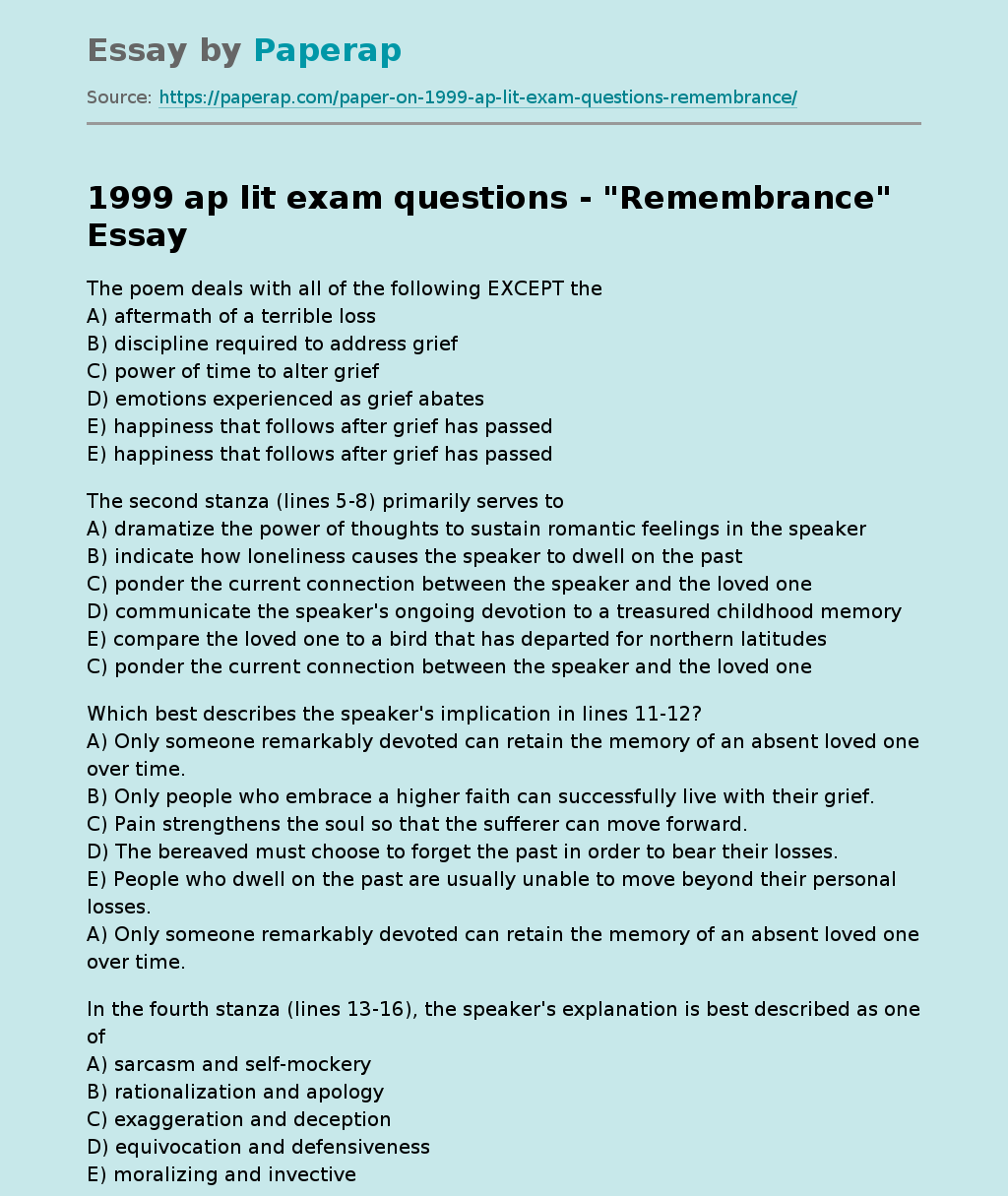1999 ap lit exam questions - "Remembrance"
A) aftermath of a terrible loss
B) discipline required to address grief
C) power of time to alter grief
D) emotions experienced as grief abates
E) happiness that follows after grief has passed
A) dramatize the power of thoughts to sustain romantic feelings in the speaker
B) indicate how loneliness causes the speaker to dwell on the past
C) ponder the current connection between the speaker and the loved one
D) communicate the speaker’s ongoing devotion to a treasured childhood memory
E) compare the loved one to a bird that has departed for northern latitudes
A) Only someone remarkably devoted can retain the memory of an absent loved one over time.
B) Only people who embrace a higher faith can successfully live with their grief.
C) Pain strengthens the soul so that the sufferer can move forward.
D) The bereaved must choose to forget the past in order to bear their losses.
E) People who dwell on the past are usually unable to move beyond their personal losses.
A) sarcasm and self-mockery
B) rationalization and apology
C) exaggeration and deception
D) equivocation and defensiveness
E) moralizing and invective
A) certainty that the loved one will forgive any transgression
B) concern that an act of betrayal would be morally wrong
C) hope that the temptations of the world will not cause unfaithfulness
D) belief that no future love will supplant the former one
E) fear that the loved one is beyond caring about their relationship
A) new love
B) rekindled hope
C) flash of awareness
D) second thought
E) spiritual awakening
A) metaphor
B) repetition
C) synecdoche
D) consonance
E) parallelism
A) mark
B) staunch
C) influence
D) examine
E) ascertain
A) necessary but addictive
B) important but dangerous
C) unpleasant but unavoidable
D) painful but instructive
E) tempting but destructive
A) Trained myself not to miss you
B) Taught myself to forgive you
C) Freed myself from suffering
D) Wished that I could help you
E) Prayed that I could be free of you
A) visit to the loved one’s grave
B) glimpse of the loved one’s feelings
C) second chance at love
D) reunion in death
E) respite from fear
A) “Despair” (line 22)
B) “passion” (line 25)
C) “soul” (line 26)
D) “wish” (line 27)
E) “tomb” (line 28)
A) “dear life” (line 19)
B) “golden dreams” (line 21)
C) “useless passion” (line 25)
D) “burning wish” (line 27)
E) “rapturous pain” (line 30)
A) The speaker, attempting to grow closer to a lost love, becomes even more distant from the loved one.
B) The speaker, in the act of remembering a childhood love, comes to an increasing awareness of mortality.
C) The speaker, in the act of mourning, is able to experience and newfound joy.
D) The speaker, worrying over forgetting a deceased lover, reveals the extent of that loved one’s continuing memory.
E) The speaker, mourning the death of a loved one, begins to recognize the extent of an attraction to a present acquaintance.
1999 ap lit exam questions - "Remembrance". (2018, Feb 19). Retrieved from https://paperap.com/paper-on-1999-ap-lit-exam-questions-remembrance/

